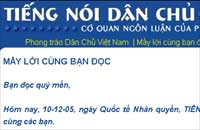




HANOI—Less than a month after its launch on International Human Rights Day, a Vietnamese pro-democracy Web site has been forced to close following an apparent hacker attack.
Visitors to the “Voice of Democracy” site last week were confronted with a notice very similar to those displayed when overseas Web sites are blocked by government filtering systems.
“Entry Forbidden! You are not allowed to download this Web page,” the notice informed Internet users in Vietnamese.
A few hours later, the Web page re-appeared at its usual address, http://www.ptdcvn.org/, but with no articles visible. A line of text below the title read: “This is the Web page of liars.” Repeated attempts to load the page Tuesday failed.
Entry Forbidden! You are not allowed to download this Web page,
The forum was set up in December by pro-democracy activist and academic Tran Khue, and the U.S.-based Nguyen Xuan Ngai, who are currently planning a move to a different server. It presented articles by political analysts on all aspects of democratization in Vietnam.
Vietnam-based Tran Khue said there was clearly a political motive behind the attack.
“All lovers of true freedom and democracy wish to have such a Web site, and they would never want to see it damaged. Therefore those who have damaged our Web site must be those who don’t love democracy or in precise words, those who betray democracy,” he told RFA’s Vietnamese service.
“They represent a very old mentality. They act according to very old rules that can hardly last long, for sure.”
Pro-democracy activist Nguyen Chinh Ket—also a contributor to the site—said he hadn’t been surprised to hear of the attack.
“This is really not a free country where people are free to say whatever they want,” he told RFA reporter Nguyen An. “The fewer words they should use to protest the government, the better. That’s what the government wants.”
Nguyen Chinh Ket predicted further technological battles between those wishing to air pro-democratic views and those who aimed to silence them.
Prominent overseas scholar and contributor to the site, U.S.-based Nguyen Ngoc Bich blamed the Vietnamese government directly.
All lovers of true freedom and democracy wish to have such a Web site, and they would never want to see it damaged. Therefore those who have damaged our Web site must be those who don’t love democracy or in precise words, those who betray democracy,
“When we first established this Web site, we knew that the Vietnamese government would certainly be dissatisfied because it always wants to monopolize communications,” he said.
“Consequently they have been trying to use their computer experts, pretty smart hackers, to disable our Web site. We’ve also made arrangements for our readers to make use of proxy servers and so on. However, in this matter it is evident that they have been successful in destroying our Web site,” Nguyen said.
He said the hackers had been traced via their computers’ IP addresses, and were based in Vietnam, with Yahoo! e-mail accounts.
The Web site pledged to provide “an atmosphere of straightforward and upright debate, but always with modesty and courtesy and in a culturally rich background”.
Its welcome message described it as, “a forum for the free expression of the viewpoints of those who fight for the democratization of Vietnam, and also a meeting place for the mutual exchange of warm affection between our compatriots overseas and in Vietnam.”
In 2004, under a set of guidelines known as Communique 99, Hanoi began tightening control over the Internet, stepping up government monitoring systems by requiring all Internet service users to show their ID cards.
Several Vietnamese cyber-dissidents have been handed stiff prison terms over the last two years for publishing material critical of the government, or for calling for greater freedom and democracy.
The government has already prohibited use of the Internet to disseminate “state secrets” and called for measures to stop acts that “infringe upon national security or social order and safety.”
The Paris-based press freedom group Reporters Without Borders (RSF) lists Vietnam as one of 15 enemies of the Internet worldwide for its filtering and blocking of Web sites which the government doesn’t like.
Original reporting in Vietnamese by Nguyen An. Written and produced for the Web in English by Luisetta Mudie. Edited by Sarah Jackson-Han.